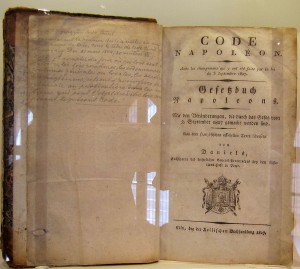In our family tree, 19th century ancestor Johann Philipp Harm, the father of Michael Harm, married twice. Johann Philipp’s first marriage in 1827 was to a woman named Elisabetha Harm Bruch, a widow more than ten years older than he was, and his first cousin. This first wife passed away in 1832, childless, when Johann Philipp Harm was just 36 years old.
“We think this first marriage was about property,” Günter told me on my first visit to Freinsheim in 1988. “To keep Elisabetha’s property in the family.”

An 1807 edition of the Code Napoleon on display in the Hambacher Schloss museum in Neustadt an der Weinstraße
A hint to a mystery, passed down from generation to generation, which may have its source in Code Napoleon civil laws.
Elisabetha and Johann married in the late 1820s, a time after Napoleon had been driven back from the Pfalz. Nonetheless, a version of the Code Napoleon, a unified set of laws on personal and property rights, had endured, including laws of equal inheritance for male and female alike. So if family lore is correct, Elisabetha Harm may have inherited property from her deceased husband? Or from her parents after they’d died? (Her parents would have been Johann Philipp Harm’s Uncle and Aunt.) If she’d had other siblings (I don’t know), they would have received an equal share.
On the other hand, when it comes to women’s rights, Elisabetha’s marriage to Johann makes little sense. The Code Napoleon was a blow to the revolutionary era’s progress on the equal rights of women.
In post Revolution France, the ideas of female equality received a setback in a series of laws known as the Napoleonic Code. Through it, the legal right of men to control women was affirmed. Although most of the basic revolutionary gains – equality before the law, freedom of religion and the abolition of feudalism – remained, the Code ensured that married women in particular owed their husband obedience, and were forbidden from selling, giving, mortgaging or buying property.
–from ‘The Wife is Obliged‘
Which begs the question, why on earth would Elisabetha have married Johann Philipp, her cousin not her lover, solely to turn over control of her property to him. So he would work her land for them both? If they did marry to keep the land in the family, what would have happened to the land if Elisabetha had never married? Did the government have right of succession?
Ah, a tangled web of mysteries. Ideas, anyone?

One response to “Marriage under the Code Napoleon”